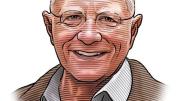Please, Harvard, no more billion-dollar buildings in Allston!
Instead, in our sixteenth quarter-century, let’s spend a small fraction of that amount improving the places where so much real learning happens: the 12 undergraduate Houses.
By far the finest and most memorable part of my academic life at Harvard was my three years as a resident tutor. There were a couple dozen of us and if the pay for our work was cheap—room and board and a little cash—for the most part the work itself was good, from such as Barney Frank ’61, J.D. ’77, no less brilliant holding court at a Winthrop House dining table than he was to become in the greater House. We tutors taught as if in seminar: perhaps eight sophomores at a time, a focused reading list, weekly short essays but no exams, ample back-and-forth discussion as we eased the youngsters into their chosen concentration. This back-and-forth continued in the dining hall, in animated conversations both within and outside of our chosen fields of study. These intimate connections created a far better learning environment than did huge lecture halls (to say nothing of “online courses”). Best of all, we encountered, among undergraduates and each other, and absorbed a love of learning for its own sake.
We enabled Harvard to benefit from the “junior-faculty bargain”—our work was far cheaper than that of tenured faculty. My hope is that Harvard will find ways to enhance House culture both to reward this good work and to insure that it, indeed, remains good. So here’s my prescription for the next 25 years:
To begin, each House master should recruit and interview carefully—seeking those few who can explain material clearly and concisely, who can impart an enthusiasm for learning, who can be patient guides to the growth of younger minds, and who have ample energy to devote to all that—then offer chosen candidates a probation year as a nonresident tutor. After that, let the tutees decide!—by secret ballot, at the end of each academic year. Tutors whose work is acclaimed would benefit by promotion from nonresident to resident, by the renewal of their residencies, or by transfer to choicer quarters.
Bright undergraduates and inspiring tutors: that’s plenty of fuel for intellectual ferment. Harvard, let’s invest in more commodious common spaces to encourage these residents to spend more time engaging with one another, in lively talk and long postprandial lingering in dining halls and common rooms. The larger Harvard community can help make these improvements toward tasty and healthful cuisine (thanks a bunch, organic-farming alumni), excellent wine cellars (merci beaucoup, alumni vintners), much improved lighting and furnishings (Danke sehr, School of Design), and better art on the walls (mille grazie, Fogg Museum).
An attractive House environment would compensate tutors for their junior-grade pay. They might also savor spending their Cambridge years in a fine House suite in the Center of Things rather than in some faraway apartment.
I hope to hear something of this sort at Commencement 2036 from graduating seniors: “My House was a true academic community, not a mere dormitory. Half of what I learned at Harvard, I learned there!”
After a long career as an epidemiologist, John Newmeyer, Ph.D. ’70, now practices the art of the dinner party at his Victorian in San Francisco and at Heron Lake Winery in the hills of Napa.









